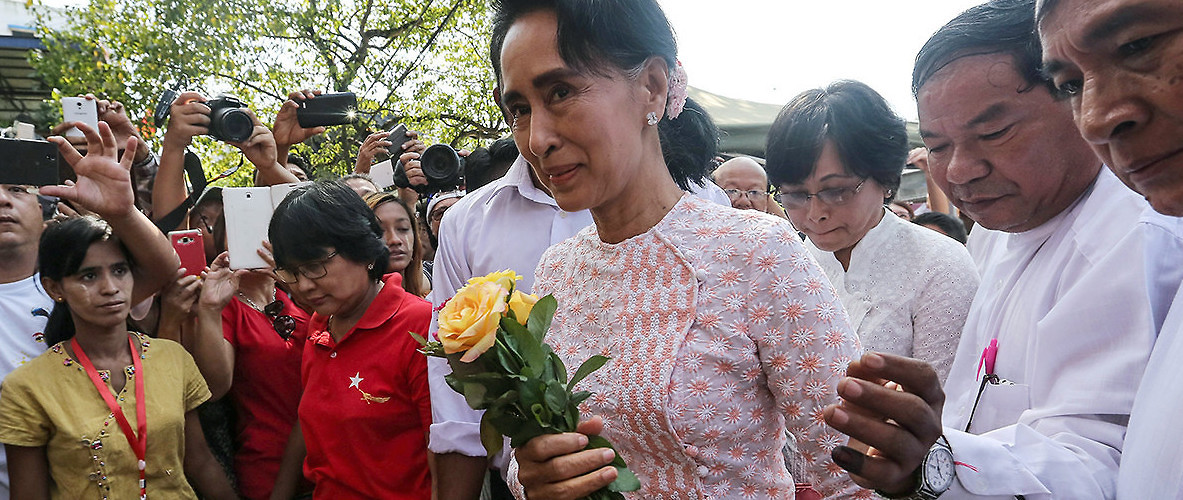Aung San Suu Kyi arrives at a National League for Democracy rally following Myanmar's election. Yangon, Myanmar, November 19, 2015. (Dario Pignatelli/Bloomberg/Getty Images)
Against the expectations of the country’s powerful military, Myanmar’s recent historic election resulted in a landslide victory for the National League for Democracy (NLD), in a largely fair and peaceful process. NLD chairperson and democratic figurehead Aung San Suu Kyi has already built on the considerable momentum, calling for “national reconciliation” and an urgent meeting with establishment figures to help progress it.
Despite remaining barred from the presidency, and the fact that much of the country’s authority remains in military hands, Suu Kyi has expressed a firm desire for recognition of what she sees as the NLD’s new mandate. However, what national reconciliation looks like to all the parties involved, and what it would mean for Myanmar’s ongoing transition, may prove a sticking point.
Following the polls, Suu Kyi requested a meeting with President Thein Sein, military Commander-in-Chief Min Aung Hlaing, and Lower House Speaker Shwe Mann. In letters to the three, Suu Kyi wrote, “A peaceful implementation of the people’s desire, which they expressed via the November 8th elections, is very important for the country’s dignity and people’s peace of mind.”
The three leaders have agreed to the talks and Suu Kyi has already spoken with Mann independently, though the details of their discussion have not been disclosed. President Sein also convened a meeting of all political parties yesterday, in which he reiterated that the transfer of power would proceed in accordance with the constitution and asked for cooperation with this goal.
However, agreeing on a pathway to national reconciliation is unlikely to run as smoothly as events to date suggest. Suu Kyi and the NLD will continue to suspect that history might repeat itself, in the sense that the military backs away from its promise to transfer power, as it did after the NLD’s previous landslide victory in 1990.
Even if the promise is honored, the NLD will want to begin a process of gradually reducing the role of the military in national politics. This will not be an easy task, with Myanmar’s 2008 constitution guaranteeing it a 25% representation in the parliament, and a role in selecting the country’s next president.
While it is essential to reach out to the military, the president, and the parliament to help achieve this goal, the NLD will also need to extend a hand to other power-wielding parties and obtain their cooperation on ensuring peace and ongoing development. The chances of a successful reconciliation process could be increased by cooperation with ethnic-based political parties, as well as the many ethnic armed groups who have fought with the military for decades.
Despite many ethnic minorities lacking sizeable representation in parliament, Myanmar’s next government needs their support to continue pursuing a peaceful solution to ongoing conflicts. This will be critical to building legitimacy, by continuing the progress made under President Sein.
On the other hand, reconciliation in the eyes of Sein, Hlaing, and other current and former military leaders is likely to mean a gradual and systematic political transition in accordance with the 2008 constitution, and nothing more. They are unlikely to want to discuss, let alone compromise on, issues such as the elimination of the quota of parliamentary seats reserved for the military, which applies to the state as well as national legislature, and the dominant role of the military in the powerful National Defense and Security Council. The military may also be unwilling to compromise on the appointment of cabinet ministers for defense, home, and border affairs, which are constitutionally reserved for members of its ranks.
Moreover, any talk of national reconciliation would have to continue to respect Myanmar’s current territorial integrity and national sovereignty. Historically, the military considers itself as the guardian and protector of the state, and will have concerns about the possible disintegration of this role, particularly if ethnic minorities’ demands for a federalist system are not peacefully addressed.
Military leaders also have lingering concerns about possible prosecution and indictment on crimes they committed during decades of authoritarian rule. Despite the implementation of some reforms in the past five years, many across Myanmar still see Sein’s Union Solidarity and Development Party as a military proxy, similar to the National Unity Party during the 1990 election.
The NLD’s electoral victory was largely a show of support for the party and its leadership. Though the personality of candidates did not play a significant role, the fact that Suu Kyi is constitutionally barred from the presidency seemed to win her sympathy, while the NLD may in some sense have been rewarded for its treatment in 1990.
Though she has faced criticism for not speaking out on recent human rights issues such as the persecution of the country’s Rohingya people, the majority of Myanmar’s population, including its ethnic minorities, have put their faith in Suu Kyi. She is seen as a trustworthy leader, who can move the country toward peace and prosperity.
Despite what appear to be dramatic changes in the political landscape, Myanmar’s people, as well as the international community, will need to understand that a true sense of national reconciliation will take time, even if the transition of power goes smoothly. While moving quickly to establish their rule, Suu Kyi and the NLD will also need to be mindful of this. They will need to build a solid platform for negotiating and resolving differences with the military, with the support of ethnic minorities a key factor.
Dr. Nehginpao Kipgen is a political scientist and author of three books on Myanmar, including the forthcoming Democratization of Myanmar.





